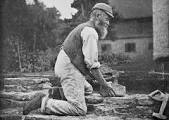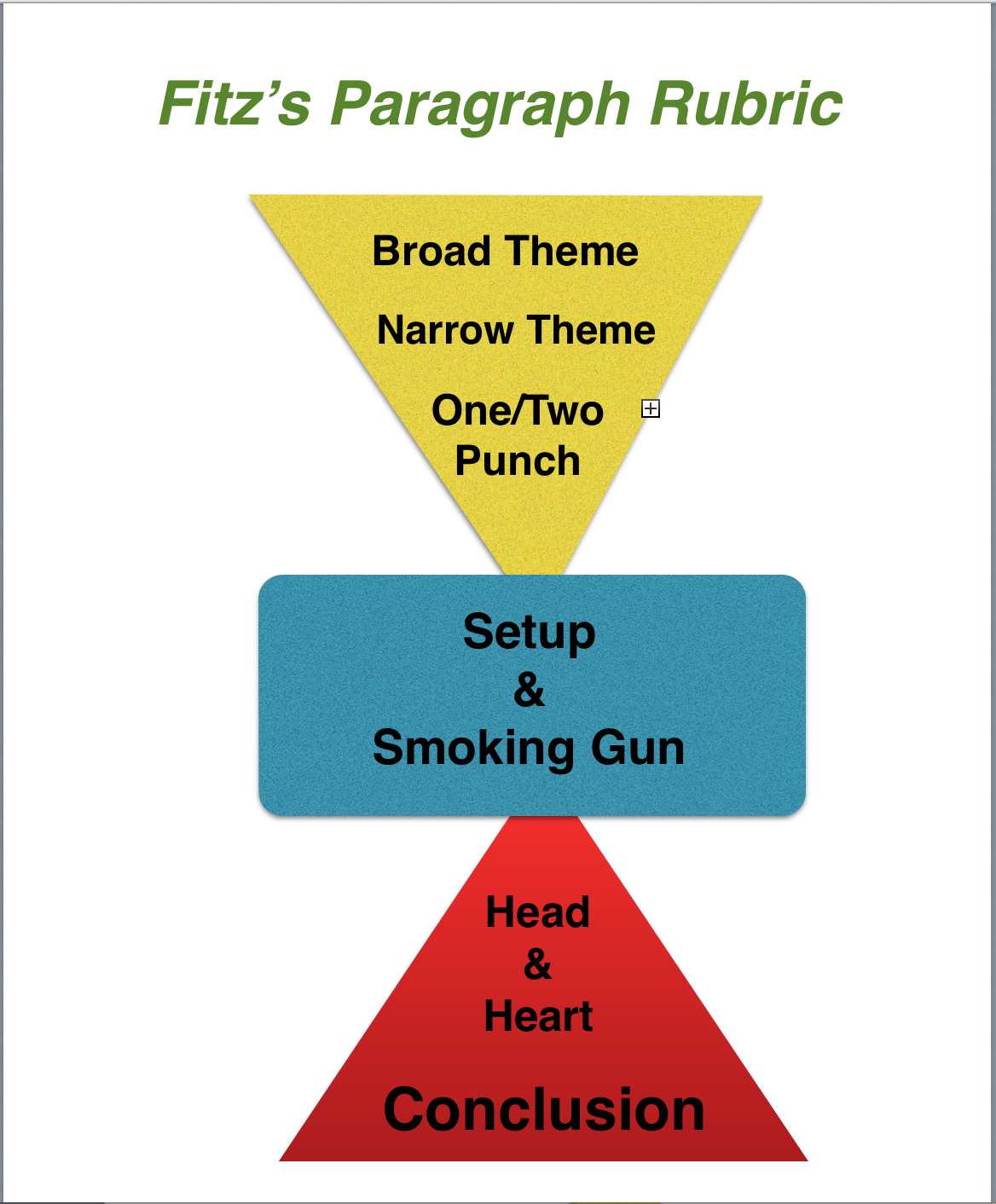
by Fitz | Sep 2, 2014 | Essays, Journal, Teaching
For the past twenty years this night has always been a bittersweet moment. I have never been hobbled by boredom or a lack of “things I love to do,” so whatever supposed free time I have is rewarding in whatever I choose to do. The flip side is that I am teacher, and I also love the start of the new school year, for it signals another round of figuring out what makes for good teaching and what makes for the best possible experience for my students.
This year my mantra is simplicity.
Over the past few months I have put in tens–if not hundreds–of hours into creating my own custom classroom that emphasizes four things: Read. Write. Create. Share. All of it is, I hope, optimized to take advantage of the fact that my school is going one to one with iPads, and all of my curriculum and relevant content is all right there in my student’s iPads. The irony of technology, for me at least, is that it can simplify almost everything I do in class; moreover, it extends the classroom in a way that keeps students engaged in reading and writing, while it also allows for dynamic possibilities to create and share with each other–and the world at large.
And there is nothing else they need to bring to class.
It seems absurd to me that my older children, who attend a different school than where I teach, dutifully fill their backpacks each morning with several bulky textbooks (the majority of the pages are destined to languish unread) AND a school supplied iPad. Given the massive amount of resources on the web, the reams of apps that enable custom content creation, and the ready availability of interactive etextbooks, it doesn’t seem like that two-inch Algebra II tome really needs to be lugged back and forth every day to and from school. I even know a few teachers who are proud to the point of self-aggrandizement that they don’t use the iPads in their classrooms, as if they have locked on to a pedagogy that will suit him or her just fine until they retire. They feel, too, like they are doing their students a favor to have them learn like “they” learned.
Thankfully, most teachers are not opposed to new ways of doing things; however, many of them have simply not learned to use the tools in their shop. Their iPads are like lathes in this shop: they will only be used when a bowl needs to be made or a small trinket can be turned. The iPads rust in place because they are not seen for what they can do; they are seen for what they have done: kids playing games between classes, airdropping idiotic selfies to each other, texting, surfing non-academic websites, or gaming with some Clash of Clans partner in Slovakia; hence, in a very real sense, we throw out the baby with the bath water where the good is lumped together with the bad and everything important is lost..
The solution should be to either have the kids on a surfboard in set of big waves or gathered around you on the beach. A lesson plan should look less at common core and more at uncommon action–action that you guide as the teacher out there in the waves with your students. If it so important for them to learn and do, it should be equally important for you to model and practice–even if you fall off the board time and time again. And, in the long run of the school year, it is really, really fun to be the “guide on the side” because you do get to know your students in a deeper and more meaningful way, and maybe that will even translate into a shared empathy profound enough to be remembered by you and your students, and that is why, too, there needs to be time on the beach; time away from the iPad; time that reminds kids that remembering and reflecting on how and why they did something is as defining as that something they created, composed, compiled, and curated.
The wistfulness of experience warns me even now that I need to be ready to shift directions when my best laid plans lead into dull waters, but still I’m pretty pumped about the year. Will this slim vessel of polished aluminum have the bits and bytes needed to transform a summer dream into a fall and winter reality? Come spring, will I be tweaking or revamping? Will I be an endless source of disdainful gossip in the teacher’s lounge?
I am inspired by a memory from a scene in One Flew Over the Cuckoo’s Nest when Jack Nicholson tries to get his fellow inmates at the asylum to rip a large sink out of the floor and throw it through a window high above to help them all escape. No one will help him, os he tries it alone and grunts and steams and screams trying to do it himself–but he can’t. In the end, he simply walk away and says, “A least I tried, goddamnit, I least I tried.”
I want to at least be able to say that.

by Fitz | Aug 8, 2014 | Essays, Journal, Teaching
My life is the poem I could have writ,
But I could not both live and utter it
~Henry David Thoreau
The common man goes to an orchard to taste the fruit. The rich man man learns how to plant his own orchard. The poet, however, grows an even better fruit and gives it all away; for in its perfection no person could afford to buy these apples that never bruise or fall or wilt in the heat. It is an apple that gives more than sustenance—it is an apple that gives life itself. For the true poet, his or her life is the vessel of humanity, and in their words they carry the collective dreams, haunts, wonderings, visions, and perceptions that lifts any who read or hear out of the muck of existence and into a more transcendent experience—an uncommon experience of common life.
(more…)

by Fitz | May 6, 2014 | Essays, Journal, Teaching
“Zou Ma Guan Hua”
You can’t ride a horse and smell the flowers
~Chinese Proverb
Sometimes I love just browsing through old folders of pictures of my kids when they were just kids in every sense of the word. Just seeing the pictures is a visceral experience for me as I try to remember the whole context of each individual picture: Charlie looking like an upside down duck eating fresh strawberries in the garden; Pipo holding a big snowball for the first time in his life; Emma airborne off a rope swing over dark waters; Tommy strumming a guitar twice the size of his two year old body; Kaleigh dressed up as a hippy nine year old singing songs from Jesus Christ Superstar; Ej building a fort in the sweep of maples in the backyard; Margaret in her eternal thoughtfulness staring out at the ocean on a sunset beach–all of these does something, evokes something, and signifies something that I never want to forget.
A picture only tells a part of the story, but it does do an amazing job of setting visual scene in a reader’s mind. As a writer, being able to create this imagery soley in words is essential to grabbing and sustaining a reader’s attention–and often your own as the writer. I personally love the marriage of images and words and sound made so easily possible on these portfolios. To lose the moment is to only see the flower at a distance.
In these last few weeks at Fenn, use your portfolio time as a way to capture and remember as much as you can. After more than twenty years teaching here, I love reconnecting with old students and sit around “remembering the day” this or that happened. Your journal and your portfolio will someday be that place we can gather around and “remember” together, and for you it will always be a place that will give more back than you ever put into it, for these years will always be a great and profound teacher to you. Fenn is a pretty remarkable place, even if right now it just seems normal and unremarkable to you.
Capture now what you can.
Before it’s lost…

by Fitz | May 2, 2014 | Essays, Journal, Teaching
The only way out is through…
Damn! Another long post…
For better and worse–and through thick and thin–I keep piling on rubric after rubric to help guide the content, flow, and direction of my students’ writing pieces. The greater irony is that I never set out to create or use rubrics with them. I was always (and still am) a great proponent of just writing until your writing skills reach the omega point–that place where you write well just because you don’t know how else to write, except “well.”
(more…)

by Fitz | May 1, 2014 | Essays, Journal, Teaching
I guess this is a good thing. I showed up five minutes late for class, and my classroom was empty. I walked the hallways of the school and could not find any of them. I sheepishly asked the assistant headmaster if he “happened to see a class of wandering boys?”
No, he hadn’t.
Another teacher said he saw random groups of boys outside filming with their iPads, so that at least is a good thing because last week I also showed up late, but the room then was a chaotic rumble of misdirection. I used my “firm voice,” and I tried to get across the point that “sua sponte” means to do what needs to be done–not to wait to be told to do something, followed by the typical teacher rants that happens when a teacher is somewhat at fault for what is happening, i.e. my tardiness for class.
But I am at least mildly pleased today to be sitting alone in my room while “class is going on.” My students are outside being productive. In that sense they at least are thinking and living outside of the box of the classroom, and I am getting a bit of a break–and I can get this daily journal post up before one of the more astute boys point out that if I don’t do it; they don’t have to do it either….
But they will have to because this is…
Posted!

by Fitz | Apr 26, 2014 | Essays, Journal, Teaching
Someday, someone might fire you for not doing
what you should have done.
There are some days when a teacher might wonder whether it is worth giving the extra effort if the students are not giving the extra effort. I am lucky–and cursed–that I get to live and see it from both sides on any given day. I log in to your portfolios and I “see” a stream of posts and pictures and thoughts and ramblings that prove that most of you care enough to go the extra mile yourself. Rarely, but sometimes I run into a dead end, a place where you can almost sense the apathy and disregard towards what I feel is real and important and enduring.
I am always stuck as to how to react. I know I can make life difficult for that student; I know I can pull out the sharp sword of the gradebook and punish him for his apathy, or I can let it slide–but the problem with letting anything slide is that we can only slide downhill with any efficiency: sliding uphill takes a good deal of effort.
That begs the question of why we would want to slide down the gnarly hill of life unless we had already reached the pinnacle of success and there was no other way to go. As a writer I know that every writing piece is a step–forwards or backwards up or down the ladder of accomplishment–and it is a long hard slog to the top, but there is no other way. So you can practice apathy, or you can practice action.
You’re either doing it, thinking about it, or ignoring it.
One day you’ll either receive your pay or be fired. Now is the time to practice being a man. Giving a damn is not a switch. It is a way of life, though ultimately it is your life, and you ‘ll either slog up or slide down.







